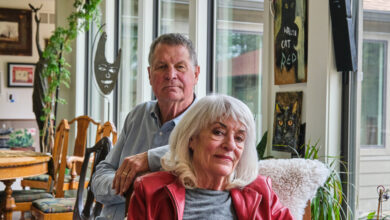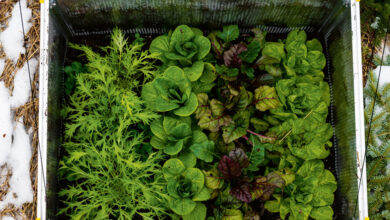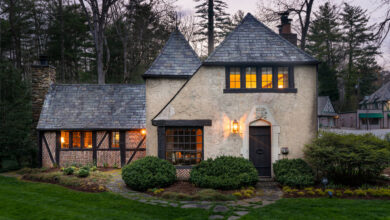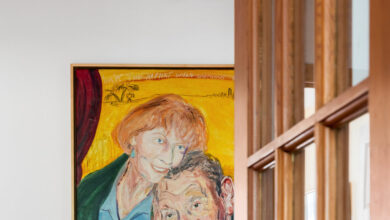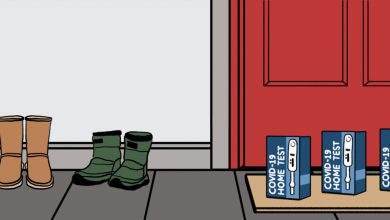House Hunting in Sweden: A Sauna-Topped Water Tower Near Stockholm
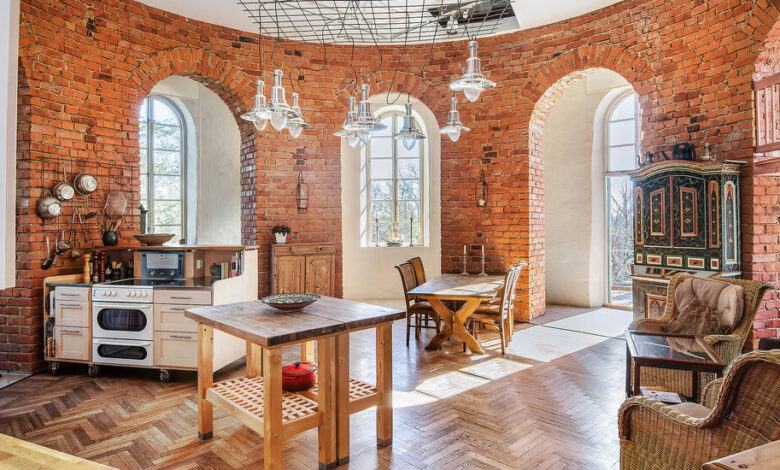
[ad_1]
Four Bedrooms in a Converted Water Tower in Sweden
$2.2 MILLION (19.7 MILLION SWEDISH KRONA)
This four-bedroom home is a converted, 108-foot water tower on Vaxon, an island in the Stockholm Archipelago, about 35 minutes east of central Stockholm, Sweden’s capital. The brick tower was built in 1923 on one of the highest points in the area to supply drinking water, and was being used as a reserve as late as 1989, said Jan Tivenius, an agent with Residence-Christie’s International Real Estate, which has the listing.
The current owners bought it in 2000 and converted it into a seven-story home with an electric sauna at the lantern-like top. The property, on about a third of an acre inside a hilly park with pine trees, has considerable income-generating potential, Mr. Tivenius said: Telecom companies currently lease antennae space on the tower’s rooftop, and a small apartment over a two-car garage in a separate A-frame wood cabin can also be rented out.
An unpaved driveway wends up the hill to the tower’s main entrance, which opens into the combined kitchen, living and dining area, with 16-foot ceilings and herringbone oak floors. The circular brick walls are lined with large arched windows. A second entrance at the back provides access to a wood deck.
The base of the tower has two concentric walls — an inner circle with an outer corridor around it — a configuration that was likely intended to provide added support for the water tank above, Mr. Tivenius said. The corridor provides space for a pantry, a bathroom and an office nook, as well as the wood staircase to the floors above.
The second floor has three bedrooms, a bathroom and a storage room. Porthole-style windows provide light.
The primary suite and another bathroom take up the third floor, where the tile flooring has a glass cutout to see below.
The fourth floor is an open area that the owners have variously used as a music room, television room and guest room. The fifth and sixth floors used to be the water tank; a floor now separates the two. The fifth floor is used for storage, and the sixth floor has a bathroom and a computer room to accommodate the telecom equipment.
The property sits next door to a preschool on the east side of Vaxon, which stretches about two miles from end to end and offers an active harbor, as well as numerous shops and restaurants. The island is part of Vaxholm municipality, a Baltic Sea archipelago comprising 70 islands and about 5,000 residents. A series of bridges connects the islands to central Stockholm; the bus from Vaxon takes about an hour. Ferries also take tourists to Vaxholms Kastell, a massive island fortress first built in the 16th century to defend Stockholm.
Market Overview
After a slump in 2017 and 2018, Sweden’s housing prices are soaring once again. Prices were up 7.5 percent last year over 2019, with a record-high number of transactions, according to a report from Nordea, a large Nordic bank. The government agency Statistics Sweden reported an overall price increase of 6 percent for one- and two-dwelling buildings, and 10 percent price growth for vacation homes.
That growth has been driven almost exclusively by demand for houses, as opposed to condos and other apartments, said Susanne Spector, an economist and the chief analyst for Nordea. As in many other markets around the globe, the pandemic has shifted buyers’ priorities toward properties with garden space and room to work remotely, she said.
The supply of homes is limited, as “the normal rotation of older people moving from their houses to city centers has been broken, since people have to stay home,” she said.
Unlike most other European countries, Sweden has relied heavily on voluntary measures to slow the spread of the coronavirus, rather than impose strict lockdown measures. As of April 2, the country had reported 813,191 Covid-19 cases and 13,498 deaths. Its excess mortality rate in 2020 was considerably lower than in most European countries, but higher than in its Nordic neighbors.
Nevertheless, consumer confidence has continued to grow, further fueling price growth. Many households feel well positioned to buy, Ms. Spector said: “Household wealth increased during 2020 — it was a very good year for households overall. Most people have kept their jobs, interest rates are low, and the stock market has boomed.”
Competition for houses is so fierce that, during the first month of 2021, bidding wars drove up selling prices to an average of 8 percent above asking, according to Erik Holmberg, a market analyst for Hemnet, a Swedish listing site. In February, the average time on market for houses hit an all-time low of 18 days, he said.
Camilla Eggenberger, an agent overseeing Swedish sales for Fantastic Frank, said that in her 33 years in the market, she’s never seen this large a divide between the demand for houses versus apartments. Everyone wants a piece of land, she said.
“The Swedish people are known for being very concerned about how they live,” she said. “We spend a large amount of our income on our homes. Now more than ever people are cocooning, and I think they’re spending even more money on their homes.”
In greater Stockholm, with about 2.4 million residents in the metropolitan area, the market for houses is extremely brisk. “It’s crazy, really,” Mr. Tivenius said. “Prices have risen 15 to 20 percent in a year.”
In the suburban areas immediately around the city, houses typically average 10 to 15 million Swedish krona ($1.14 million to $1.72 million), depending on the area, he said. Anything cheaper than that would require considerable renovation. More exclusive properties are priced between 15 and 20 million krona ($1.72 million to $2.29 million), with seafront properties typically closer to 35 million ($4 million), he said.
Apartments in central Stockholm average around 100,000 krona a square meter, or $1,060 a square foot, he said.
Who Buys in Sweden
Foreign buyers make up a small share of homeowners in Sweden. In 2020, Statistics Sweden reported that 37,979 vacation homes were foreign-owned — about 6 percent of the total. Norwegians accounted for about a third of those owners, closely followed by Germans and Danes, at 27 percent each. Another 2.2 percent are owned by Swedes living abroad.
In Stockholm, fewer than 1 percent of vacation homes are foreign owned.
Ms. Eggenberger said her nonresident buyers are often diplomats or Swedish citizens who are returning to the country after working elsewhere for many years “with a lot of money to spend.”
Buying Basics
There are no restrictions on foreign buyers in Sweden. It is usually not necessary to hire a lawyer — the seller’s agent typically handles everything in the transaction, Mr. Tivenius said.
In greater Stockholm, the agent’s commission can vary, but on houses it usually averages around 1.5 to 2 percent, he said.
Websites
Languages and Currency
Swedish; Swedish krona; 1 krona = $0.11
Taxes and Fees
Buyers pay a stamp duty of 1.5 percent of the purchase price. It applies only to houses, not to apartments, Ms. Eggenberger said.
The annual property taxes on this house are about 8,500 krona ($970).
Contact
Jan Tivenius, Residence-Christie’s International Real Estate, 011-46-70-617-96-06; christiesrealestate.com
For weekly email updates on residential real estate news, sign up here. Follow us on Twitter: @nytrealestate.
[ad_2]
Source link


